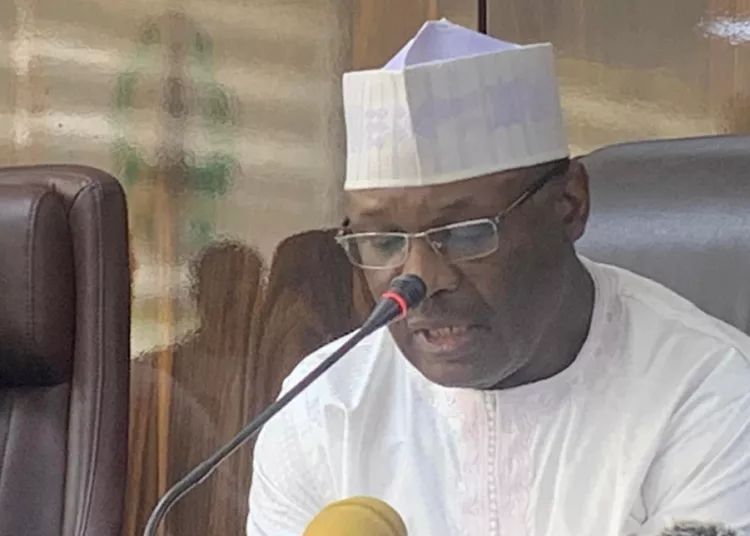The swearing-in and posting of Professor Muhammad Lawal, as the Resident Electoral Commissioner (REC) for Jigawa state by the Independent National Electoral Commission (INEC) is, not only a violation of the Nigerian Constitution, but also an act that has the tendency to cast doubt on the outcome of the election in the state.
Lawal, onetime All Progressives Congress (APC) governorship aspirant in Sokoto state and former Special Adviser, is now saddled with the responsibilities of superintending over the 2023 elections in Jigawa state. The fact that the ruling APC, Lawal’s political party, has a stake in the election, is enough both as an incentive and a justification for the allegation of bias.
As the 2023 election draws closer, Nigerians and, indeed, all those interested in the political growth and survival of the Nigerian polity, have a right as expected to beam their searchlights on the conduct of INEC whose chairman, Professor Mahmood Yakubu, has repeatedly assured the nation that it would ensure the conduct of credible polls.
Indeed, nothing underscores INEC’s determination to conduct a credible poll more than its insistence on deploying effectively, the use of technology, in line with the amended electoral act. The electoral umpire has said repeatedly, that it would deploy the use of technology like the Bimodal Voter Accreditation System (BVAS) and the INEC Result Viewing Portal (IReV), for the forthcoming election as part of measures to guard against those intent on causing mischief designed to cast aspersion on the entire process.
However, beyond the effective deployment of technology, it is the considered opinion of this newspaper that the electoral umpire needs committed and non-partisan personnel for it to deliver on that mandate of giving Nigerians, a free and fair election. This presupposes that the officials of INEC must be politically neutral and seen to be so.
It is pertinent to point out the provisions of Section 14(2a) of the Third Schedule to the 1999 Nigerian Constitution clearly states that, “a member of the Independent National Electoral Commission shall be non-partisan and a person of unquestionable integrity.” To this extent, therefore, the appointment, screening and subsequent swearing-in and posting of Professor Lawal as REC to Jigawa state is a violation of this section of the 1999 constitution. In our opinion, that decision must be reviewed and rescinded forthwith.
We recall that when President Muhammadu Buhari submitted names of 19 nominees for appointment as RECs, to the senate, a coalition of eight civil society organisations raised issues with the character and suitability of some of them. Specifically, the civil societies called on the Senate to reject the nominees, who included Lawal, because their nomination violated the provisions of the 1999 Nigerian constitution as amended.
The organisations claimed that the appointment negated the criteria and procedure needed to guarantee and protect the neutrality, objectivity and non-partisanship of INEC.
The CSOs also lamented that the nominees from Sokoto, Enugu, Imo and Ebonyi states were either APC political loyalists or persons indicted for corruption in the past, which they said breached the constitution on appointment of INEC Resident Electoral Commissioners.
Sadly, in our view, and in defiance to this constitutional aberration, the Senate went ahead and screened the nominees including Professor Lawal, who have since been appointed and posted to different states, to oversee next year’s general election.
Professor Lawal’s appointment reminds Nigerians of Ms Lauretta Onochie, who was appointed to serve as INEC commissioner representing Delta state, by President Muhammadu Buhari in October 2020. As should be expected, Onochie’s appointment triggered outrage among Nigerians with many describing it as unconstitutional because she is openly partisan. Good enough, following public outcry, the president withdrew her nomination.
As for Professor Lawal, the senate for reasons we still cannot fathom, ignored the outcry and alarm raised regarding the unconstitutionality of his appointment, and eventually screened him. This newspaper is worried that aside from being less thorough in discharging their duties effectively, the senate seems to have no hesitations in contravening the laws they themselves have made.
In screening and consequently approving the nomination of Prof Lawal, knowing fully well that he is partisan, the senate out rightly contravened Section 14(2a) of the Third Schedule to the 1999 Nigerian Constitution. If the fact that they breached the law passed by them did not infuse in them a sense of revulsion as lawmakers, then we wonder what else would. Indeed, the senate is sending a wrong signal to the Nigerian public.
Like most Nigerians, we are worried that the Jigawa REC and indeed, any other partisan appointment in INEC, will cast doubt on the outcome of the election. The only available option is for the president to rescind all such appointments. There is still time to do things right.





